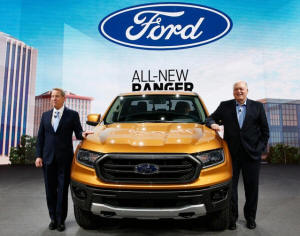Ford plans $11 billion investment, 40 electrified
vehicles by 2022
 Send a link to a friend
Send a link to a friend
 [January 15, 2018] [January 15, 2018]
By Nick Carey and Joseph White
DETROIT (Reuters) - Ford Motor Co <F.N> will significantly increase its
planned investments in electric vehicles to $11 billion by 2022 and have
40 hybrid and fully electric vehicles in its model lineup, Chairman Bill
Ford said on Sunday at the Detroit auto show.
The investment figure is sharply higher than a previously announced
target of $4.5 billion by 2020, Ford executives said, and includes the
costs of developing dedicated electric vehicle architectures. Ford's
engineering, research and development expenses for 2016, the last full
year available, were $7.3 billion, up from $6.7 billion in 2015.
Ford Chief Executive Jim Hackett told investors in October the automaker
would slash $14 billion in costs over the next five years and shift
capital investment away from sedans and internal combustion engines to
develop more trucks and electric and hybrid cars.
Of the 40 electrified vehicles Ford plans for its global lineup by 2022,
16 will be fully electric and the rest will be plug-in hybrids,
executives said.

"We're all in on this and we're taking our mainstream vehicles, our most
iconic vehicles, and we're electrifying them," Ford told reporters. "If
we want to be successful with electrification, we have to do it with
vehicles that are already popular."
General Motors Co <GM.N>, Toyota Motor Corp <7203.T> and Volkswagen AG <VOWG_p.DE>
have already outlined aggressive plans to expand their electric vehicle
offerings and target consumers who want luxury, performance and an SUV
body style - or all three attributes in the same vehicle.
Mainstream auto makers are reacting in part to pressure from regulators
in China, Europe and California to slash carbon emissions from fossil
fuels. They also are under pressure from
Tesla Inc <TSLA.O>'s success in creating electric sedans and SUVs that
inspire would-be owners to line up outside showrooms and flood the
company with orders.
GM said last year it would add 20 new battery electric and fuel cell
vehicles to its global lineup by 2023, financed by robust profits from
traditional internal combustion engine vehicles in the United States and
China.
GM Chief Executive Mary Barra has promised investors the Detroit
automaker will make money selling electric cars by 2021.
Volkswagen said in November it would spend $40 billion on electric cars,
autonomous driving and new mobility services by the end of 2022 –
significantly more than when it announced two months earlier it would
invest more than 20 billion euros on electric and self-driving cars
through 2030.


[to top of second column] |

Bill Ford,
executive chairman of the Ford Motor Company and Jim Hackett (R),
President and CEO, present the 2019 Ford Ranger during the Ford
press preview at the North American International Auto Show in
Detroit, Michigan, U.S., January 14, 2018. REUTERS/Rebecca Cook

Toyota is racing to commercialize a breakthrough battery technology during the
first half of the 2020s with the potential to cut the cost of making electric
cars.
Ford's additional investments in electric vehicles contrasted with many of the
vehicle launches at the Detroit show which featured trucks and SUVs. On Sunday
evening, Daimler AG <DAIGn.DE> unveiled its new G-class SUV, a bulky off roader,
in an abandoned movie theater in downtown Detroit once used as a set for the
movie “8 Mile.”
Daimler CEO Dieter Zetsche hinted to Former California Gov. Arnold
Schwarzenegger during an exchange on stage next to the G-class that Daimler
would someday have an electric version of the vehicle.
SUVs figured in Ford's electric vehicle presentation. The automaker's president
of global markets, Jim Farley, said on Sunday that Ford would bring a
high-performance electric utility vehicle to market by 2020. The company will
begin production of a hybrid version of its popular F-150 truck at a plant in
Dearborn, Michigan, in 2020.
"What we learned from this first cycle of electrification is people want really
nice products," Farley said.

'THINK BIG'
Ford’s shift to the electric vehicle strategy has been more than six months in
the making after Hackett replaced former Chief Executive Mark Fields in May.
The plan was finalized in recent months after an extensive review, a person
familiar with the process said. In October, Ford disclosed it had formed a team
to accelerate global development of electric vehicles, whose mission is to
“think big” and “make quicker decisions.”
Some of the electric vehicles will be produced with Ford’s JV in China aimed at
the Chinese market. One aim of Ford’s “Team Edison” is to identify and develop
electric-vehicle partnerships with other companies, including suppliers, in some
markets, according to Sherif Marakby, vice president of autonomous vehicles and
electrification.
China, India, France and the United Kingdom all have announced plans to phase
out vehicles powered by combustion engines and fossil fuels between 2030 and
2040.
(Reporting by Nick Carey and Joseph White; Additional reporting by David
Shepardson in Detroit; Editing by Peter Cooney and Muralikumar Anantharaman)
[© 2018 Thomson Reuters. All rights
reserved.] Copyright 2018 Reuters. All rights reserved. This material may not be published,
broadcast, rewritten or redistributed. |